Unlike other Greek deities, Demeter is relatively obscure. But she was a major figure in the ancient world. Demeter was Zeus’s sister and a member of the Olympian pantheon. She’s the Goddess of Agriculture agriculture and provides food to the mortals.
Typically, depictions of the goddess Demeter feature a woman with a sheaf of wheat or a cornucopia in her hands. One of the most significant figures in ancient Greek religion, Demeter was not always at the forefront of the Greek pantheon. However, she presides over the harvest, the fields, the grain supply, the sacred law, and the fertility of the land, all very important necessities.
Most people in rural areas and the countryside worshipped the goddess Demeter. In ancient culture, people honor her as the one who rules over the changing of the seasons. Her ceremonies frequently involve themes of birth, death, and rebirth.
Demeter as the goddess of agriculture also symbolizes the rebirth and death that occur throughout one’s life. Today, we will learn more about Demeter and how she shaped the seasons through her fascinating life.
The Goddess Demeter In History & Myth
Demeter, the Greek goddess of agriculture, was born in the mythical Golden Age of Greece. This was the time when Cronus and the Titans were the rulers of the universe. Born to Cronus and Rhea, Demeter was part of the brood that also includes Zeus, Hades, Poseidon, Hestia, and Hera.
Back then, Cronus received warning that one of his offspring would one day overthrow him, just as he ousted his father Uranus. To secure his reign, Cronus swallowed his children as soon as they were born.
However, Rhea hid her son Zeus in a cave after he was born. Instead, she gave Cronus a stone disguised in his clothing, which he promptly ingested. Zeus, upon reaching adulthood, posed as an Olympian cupbearer to poison his father’s wine and get him to drink it. As a result, Cronus ejected Zeus’ sisters Hestia and Demeter and his brother Poseidon and Hades.
A little later, Demeter begins an affair with Zeus, her brother. From their union emerged Persephone, who would one day reign as a goddess of the underworld.
Demeter’s Name
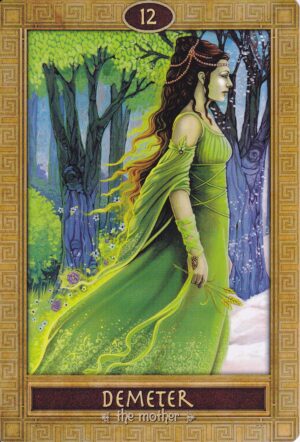
The name Demeter is split into two parts: De and Meter. The suffix “-meter” almost always means “mother.” This is a concept that neatly corresponds to Demeter’s function as a goddess of motherhood.
However, there is an ongoing discussion about what the first part of the name means. The vast majority of academics connect it with the prefix “ge,” which can also stand for the Greek word for “Earth,” Gaea. Others connect “De” with “Deo,” a surviving epithet of Demeter that’s also the name of some grains in an earlier form.
Demeter and the Seasons
In addition, Demeter and her myths represent a wide variety of cycles. The cycle of the seasons, which repeats itself from summer to fall, winter to spring, and then back to summer, is the most readily apparent.

Demeter and Persephone’s story is one of the more significant Greek myths. In this particular tale, the cycle moves from grief to acceptance. It demonstrates how one’s feelings of loss can repeatedly surface and then disappear. The myth of Demeter is an example of a mother story, as it tells of the natural progression of a child “leaving the nest,” as the saying goes.
Demeter, Goddess of Agriculture
Demeter is best known as the Greek agricultural goddess. In this capacity, She is associated with the cultivation of both fruit and vegetable crops and grain.
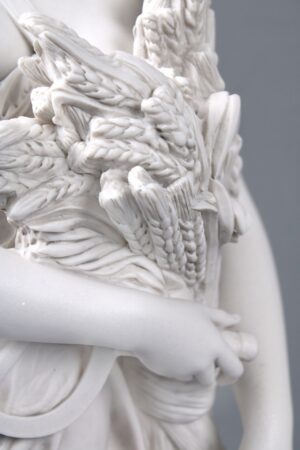
The creation of grain and its subsequent cultivation and harvesting in Sicily are attributed to Demeter in some accounts. Not surprisingly, given her association with grain, Demeter was also the Greek goddess most closely associated with baking bread.
The goddess Demeter, along with other Greek deities, was also connected to order and law. She was one of the divine advisors who taught man how to follow the law.
Demeter and Persephone
Demeter is also connected to the underworld. This is because she is the one who found out that Hades has kidnapped her daughter Persephone and took her to his kingdom in the underworld.
Persephone was abducted into the underworld by Hades to make her his wife. Since Demeter was so overcome with grief over the capture of her daughter, she stopped caring for the land, which eventually resulted in a famine.
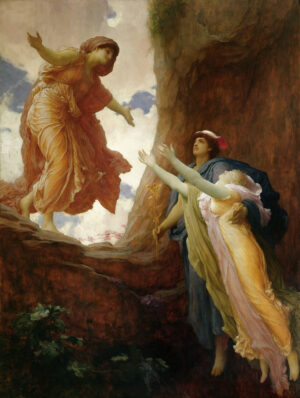
As more time passed, Zeus began to feel concerned about the human race because they were unable to cultivate any form of food. He called Demeter to Olympus and demanded that she cease the effect she was having on the landscape. Demeter made a vow that she would only end the famine and the bitterly cold weather if she reunites with her daughter.
Zeus had no choice but to make an effort to fulfill Demeter’s request. Her power and influence on earth were too great to ignore completely. Her flaming torches were also a magnificent sight to behold.
Pomegranates and Time Sharing
Zeus eventually gave in and informed Hades of the situation. Hades agreed to release Persephone to her mother to save humanity. However, Hades presented Persephone with a pomegranate just before she left the Underworld.
A common belief among the immortals is that if one were to consume anything from the Underworld, they would be trapped there forever.
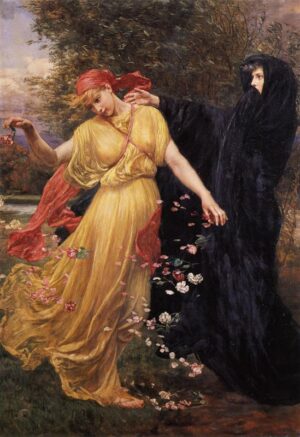
Different sources claim different things about whether or not Persephone was aware of this trickery. She devoured a third of the pomegranate, but Demeter successfully negotiated with Zeus on her daughter’s behalf.
The result was that every year, for one-third of the year (or one-half, depending on the myth), Persephone would visit her husband in the Underworld. Then she spends the rest of the year in the company of her mother and the living.
Eleusinian Mysteries
Demeter and Persephone’s eternal reunion and separation epitomized the recurrent nature of both the seasons and the cycles that govern them. Once again, we find ourselves amid the grieving-to-acceptance cycle. Another way to put it is as a journey to the underworld and back up to the surface of life.
Persephone’s sojourn in Hades brings on the coldest months of the year. We usher in spring gradually as Demeter’s mood improves in anticipation of her daughter’s return. With their reunion, mother and daughter enjoy a summer full of blooming flowers. The chill of autumn is in the air as Demeter reluctantly sends her daughter back to Hades.
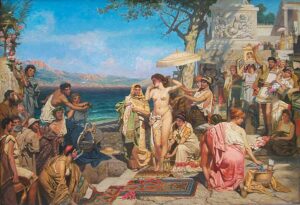
As a result, the Eleusinian Mysteries are the most well-known of ancient Greece’s secret religious rites. According to the Homeric Hymn to Demeter, the earth goddess Demeter went to Eleusis (an area of the Underworld) to find her daughter Persephone. This story was the foundation of the Eleusinian Mysteries.
The Eleusinian Mysteries played a significant role in the ceremonies of the worshipers of Demeter. As part of the Mystery ritual, the entire cycle would be re-enacted. This reoccurring event begins with Persephone’s abduction (or “the descent”). It continues with the “search,” and concludes with their reunion (or “the ascent”) from the Underworld.
One of the few things known about the Mysteries is that anyone invited to join is expected to keep the Mysteries’ rituals secret. One must keep quiet about the Mysteries. Revealing was a capital offense.
Some historians believe that the Eleusinian Mysteries involved psychedelics. Others believe it was an occult initiation ritual into the Underworld, the demonic realms, or the darker side of the self to gain power.
Demeter’s Appearance:
The goddess Demeter is typically depicted as a mature woman. She wears an elaborate dress and a crown. She is also often drawn sitting on a throne.
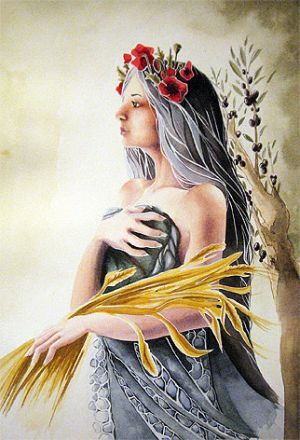
In images where she is standing, she is carrying what looks like sheaves of wheat or barley. She sometimes appears to be holding a cornucopia or the Eleusinian torch, which has four heads.
The poem “Odyssey” written by Homer describes her as having blonde hair. On the other hand, the majority of depictions of her in art show her with dark hair that is curly.
Demeter’s Archetypes:
Caring, sympathetic, and kind, Demeter is the quintessential nurturing mother figure. According to many myths, she was very charitable and frequently bestowed gifts on her admirers. If she feels wronged, however, she may resort to revenge.
A Mother
Life-giving and the wellspring of care, loyalty, tolerance, and unconditional love, the Mother Archetype is central to many cultures and religions. The essence of a good mother is her willingness to forgive, provide, and prioritize for her children.
Demeter loves her daughter, Persephone, very much. After her daughter was taken from her, she sank into a deep depression.
To the plant kingdom and the land, she also serves as an Earth Goddess every spring. But she leaves behind her role as “mother earth” in her quest to find her missing daughter. Persephone’s yearly visit to her husband in the underworld leaves her unable to fulfill or carry out this duty.

Rescuer
Rescuers are people who help others when they need it most. That’s whether in the midst of a dire emergency or on a more regular basis. They serve others without expecting anything in return because they are motivated by love.
When Persephone disappears, Demeter is devastated and cannot rest until she finds her. It has made her angry that she must put her daughter’s needs before her own to try to save her.
Demeter’s Powers:
The earth goddess is an extremely overprotective and kind-hearted mother. However, she is also prone to getting overly stressed out. In addition to this, the goddess Demeter is quite volatile and will go to any length to be with her daughter.

Demeter, goddess of the earth, holds complete power over the natural world in her role as a goddess. Her daughter Persephone inherited this ability, and she has the power to resurrect or kill plants simply by touching them.
The goddess Demeter can defend herself and build walls using plants as well. She can communicate with flowers, particularly the poppy, a brilliant red flower that grows among the barley.
How Do You Know If The Goddess Demeter Is Calling To You?
Having a deity is one of the best things ever, as this means improving your craft and quality of life. But how do you know if a goddess like Demeter is calling to you?
If goddess Demeter is trying to get your attention, here are the signals to look out for.

You dream about Demeter
If you dream about a goddess, she made an obvious appearance in your astral realm. You may dream that Demeter is directly addressing you or that you overhear someone else mentioning her name. Or you could also encounter a picture or a book dedicated to the goddess Demeter. Try to recall your dreams or pay closer attention to your surroundings.
Images of Demeter and her iconography appear frequently.
If you read enough about Demeter, you might start to see references to her wherever you go. You may see these references in people’s clothing, jewelry, tattoo, or even song lyrics. You might even see the goddess’s depictions in advertisements or on television. Observing them in the real world suggests that there is a call for you to work with Demeter.
You often see her animal messengers
The majority of deities and demigods have animal avatars and messengers. Their art and stories feature them prominently. Most domestic animals, pigs, and snakes are sacred to Demeter. If you encounter any of these animals frequently in unusual settings, then it could be a sign Demeter is calling you.
Did you ever experience any of these signs and research them further? If you have, you may also want to look for these common symbols linked with the Goddess Demeter.
Demeter’s Symbols:
- Cornucopia, which is also known as the horn of plenty.
- Barley
- Bread
- Corn
- Mint
- Poppy
- Wheat
- Pig
- Snake
- Torches

Most depictions of Demeter, goddess of the harvest, feature her holding a cornucopia or sheaves of wheat. When looking for her missing daughter, she frequently used a torch as a beacon.
This Goddess also revered the grains wheat and barley, as well as mint and the poppy. Other items and plants associated with this goddess are chaste trees, frankincense, myrrh, and sunflowers.
How To Work With The Goddess Demeter:
Now that you recognize the signs and symbols, you may also have the knowledge to interpret them. You are aware now that Demeter is calling you. You’re ready, but how do you collaborate with her? First, please consider the following:
You don’t have to be a mother to work with Demeter. Anyone who cares and has concern for other living things throughout their lives fits this description.

You can be an aunt who looks after her nieces and nephews. You may also be a chef, teacher, artist, or health worker. Perhaps you are the eldest sibling as well. Allow the younger people in your life to make their own decisions and learn from their mistakes, but always be there to help and guide them when they need it.
You can also take on the role of Demeter, the rescuer. This aspect of Demeter will appeal to you more to you if you’re the type who’s always trying to save and help others.
You need to evaluate why you are acting in this manner. Do you want something in return for your assistance, or do you simply enjoy being of service? The goddess Demeter can help you figure this out and regain your strength.
Lastly, the goddess Demeter can teach you quite a bit about the mysteries and initiation. While she represents the light mother, she also has a tie to the dark mother, which is the other side of initiation.
Devotional Acts to Demeter

Whether you identify more with the role of mother or rescuer, the following, you can offer the following devotional acts to the goddess of the harvest.
- Plant flowers associated with the goddess Demeter, like daisies and sunflowers. Gardening is the act of planting and tending to a plot of land. Taking care of something as simple as a potted plant will bring you closer to her as you both watch it flourish
- Give your pets and other animals lots of love and attention.
- Volunteer in initiatives that ensure the protection of the rights of farmers and migrant workers.
- Support your local farmers by purchasing their products.
- Help abandoned women and children. Donate your time, knowledge, or money to a shelter or organization that provides crisis counseling.
- Enjoy a stroll through the park. And don’t forget to gather some flowers.
- Get together with loved ones and the people who can always bring a smile to your face.
Offerings For Demeter:

Fresh fruits, flowers, and grains are the traditional gifts for Demeter. The first harvest (of fruits, flowers, or grains) is the ideal offering if you are a farmer. On the other hand, you could always present those things sacred to Demeter or associated with her.
- Flowers: daisy, poppy, sunflower
- Farming Tools
- Sheaves of Wheat
- Fresh Fruits
- Olive Oil
- Honey
- Bread
- Animals: Cats and dogs (all domestic pets), cranes, lions, lizards, snakes
- Plants: ash and oak trees, acorns, cypress, foxglove, columbine
- Scents: cloves, cinnamon, mint, myrrh, orange blossom, olibanum, patchouli, violet
- Stones and Gems: amber, almandine, citrine, topaz
What Can You Learn From Demeter?
Demeter was the fertility goddess associated with fields, grain, and the harvest. All the plants, food, and vegetables that mortals eat today came from her. Plus, she taught them how to grow wheat. Demeter demonstrated the proper methods for sowing, tending, and harvesting the seeds.
By nurturing life and caring for the mortals by providing them with food, Demeter teaches us about kindness and compassion.

Even in the wake of the abduction of her daughter Persephone, you can find solace in her words.
Demeter serves as a guide for how you handle the various stages of your life.
Love, family, grief, loss, and the rebirth of hope are all themes that run through the story of Demeter and Persephone.
This story is also about how much a mother cares for her child. Demeter even challenged Hades, the Lord of the Underworld, to retrieve her daughter. These qualities of courage and resolve should encourage us to stand up for what is just. Demeter reminds us to keep going even if things don’t work out the way we planned.
My Experience Working With Demeter
The Greek goddess Demeter is an epitome of generosity more than any of the other Olympian goddesses.
She was the only Greek goddess who cared about the day-to-day happenings of regular people.
At times when it suited their purposes, other gods “dabbled” in human affairs. Or they aided “special” humans whom they considered to be worthy of special treatment. And yet, it was the goddess Demeter who served as humanity’s true nurturer.
Demeter was also the only Greek goddess who personally experienced loss and suffering, experiences that many humans can relate to.
Women have an incredible capacity to love and nurture, and the story of the Greek goddess Demeter shows us how and why.
Neither mothers nor people her age are the only ones with a natural tendency to care for others. Even us younger women can connect to the Goddess Demeter, because we all have loved and lost, and we all have things and people we are passionate about.
Demeter encourages me to maintain my unwavering commitment to what is right and just. That I need to keep my head up even when it seems like the whole world is against me.
The message of Demeter, the goddess of the harvest, also makes me think of a woman’s life in terms of the four seasons.
Even though there are dark times, there is also an abundance of light. Trust the seasons if we cannot see the proverbial light at the end of the tunnel just yet. Demeter may despair during winter, but as spring comes around, hope abounds. Darkness cannot rule all the time.


